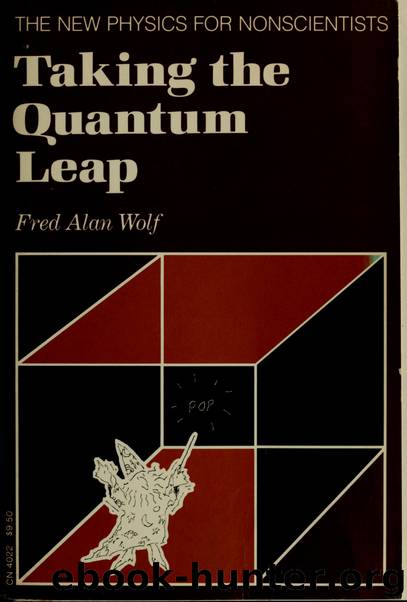Taking the quantum leap : the new physics for nonscientists by Wolf Fred Alan

Author:Wolf, Fred Alan
Language: eng
Format: epub
Tags: Quantum theory, Physics
ISBN: 0060551372
Publisher: San Francisco : Harper & Row
Published: 1981-11-13T16:00:00+00:00
I
Complements of the Cosmic House 151
The Principle of Complementarity: A Recap
The quantum is tiny. The world we live in depends on thepictures of that world we paint in our minds. Because of thesmallness of the quantum, these pictures seem quite consistentand continuous, logically connected to our pasts and a reason-able basis for our futures. From our classical heritage, twonaturally occurring pictures of nature have emerged. These arethe wave and particle descriptions of reality.
Physicists thus attempted to interpret all experience interms of these pictures. Their attempts met with failure. Thisfailure was due to the unforeseen and necessary disturbancecreated by the observer when he observed the atomic world.The world appeared paradoxical and discontinuous because wetried to use these pictures and ignored our own presencesin the world.
Both of these schemes—our ignorance of our presence andthe wave-particle picture—work successfully for mechanicaleveryday objects. The reason for their success with these objectsis the smallness of the quantum. But it is finite and not zero.In other words, ultimately and fundamentally we affect theuniverse. Our presence can be felt drastically on the atomic leveland hardly at all on the everyday, macroscopic level. In ourattempts to leave ourselves outside of reality and our insistenceon waves and particles as a description of reality, we are forced toregard the universe as paradoxical and dualistic, consisting ofcomplementary attributes.
Although these ideas appear reasonable and were more orless accepted by most of the physical community, they containa rather disturbing feature. Einstein was referring to this featurewhen he said, "God does not play dice with the universe."Somehow, in Einstein's mind, reality must be real. There must bean "out there" out there. The idea that whatever form realitytakes is dependent upon the whim of the observer was repugnantto Einstein. Even more repugnant was the idea that the observeris powerless to control his fate.
In an effort to disprove the Bohr interpretation and reaffirmthe continuity position, Albert Einstein and two of his associatespresented a very careful and controversial paper in 1935. Thesubject of that paper was later to be called the EPR paradox. Itsaid that quantum mechanics was not the last word on reality.However, it failed to suggest any solution for what might beadded to or substituted for quantum mechanics. It also led toa new and unsuspected connection between all material objects.
Chapter 9
Download
This site does not store any files on its server. We only index and link to content provided by other sites. Please contact the content providers to delete copyright contents if any and email us, we'll remove relevant links or contents immediately.
The Complete Stick Figure Physics Tutorials by Allen Sarah(7375)
Secrets of Antigravity Propulsion: Tesla, UFOs, and Classified Aerospace Technology by Ph.D. Paul A. Laviolette(5373)
Thing Explainer by Randall Munroe(3941)
The River of Consciousness by Oliver Sacks(3606)
The Order of Time by Carlo Rovelli(3196)
How To by Randall Munroe(3118)
A Brief History of Time by Stephen Hawking(3028)
I Live in the Future & Here's How It Works by Nick Bilton(3001)
What If?: Serious Scientific Answers to Absurd Hypothetical Questions by Randall Munroe(2705)
The Great Unknown by Marcus du Sautoy(2695)
Midnight in Chernobyl by Adam Higginbotham(2550)
Blockchain: Ultimate Step By Step Guide To Understanding Blockchain Technology, Bitcoin Creation, and the future of Money (Novice to Expert) by Keizer Söze(2496)
Networks: An Introduction by Newman Mark(2407)
The Meaning of it All by Richard Feynman(2356)
Easy Electronics by Charles Platt(2334)
The Tao of Physics by Fritjof Capra(2276)
Midnight in Chernobyl: The Untold Story of the World's Greatest Nuclear Disaster by Adam Higginbotham(2238)
Introducing Relativity by Bruce Bassett(2125)
When by Daniel H Pink(2118)
